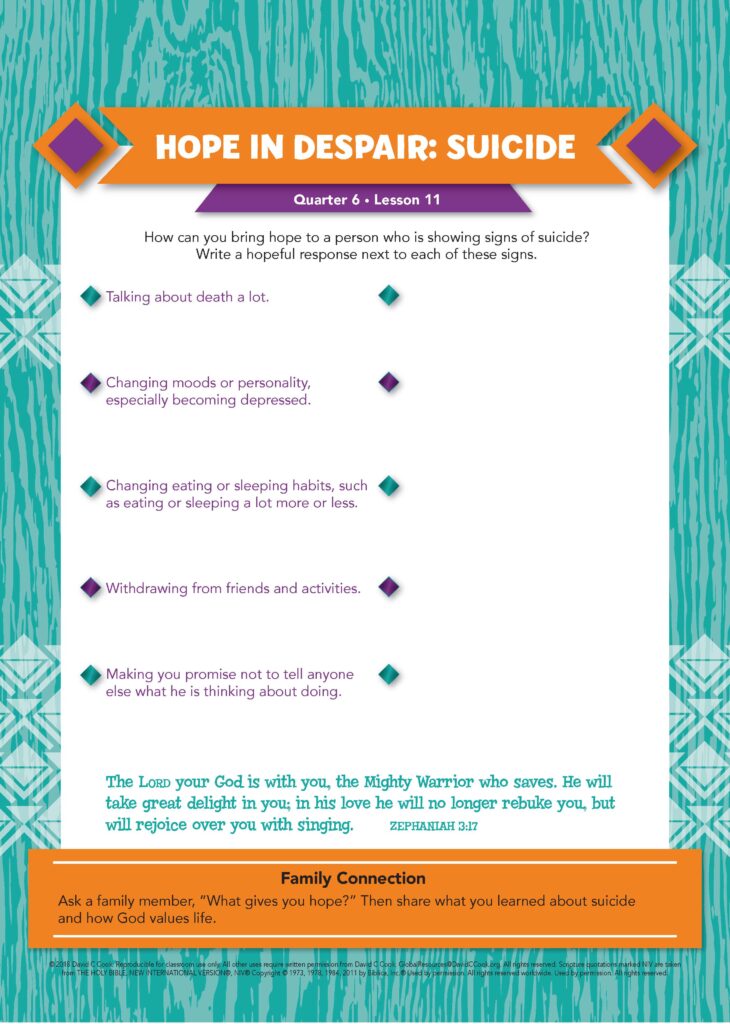During the lesson, the information for you to know is written in regular type, and what we suggest speaking or reading aloud to children is in bold. All resources for this lesson, including the Teacher Guide, Student Page, Family Connection Card, and other resources can be downloaded in a ZIP file by clicking on the following link:
In some lessons you will find "resource articles." These are articles written by experts from around the world to help equip you for your work with children and adolescents. Share them with parents or guardians if you consider it appropriate.
We were under great pressure, far beyond our ability to endure, so that we despaired of life itself. Indeed, we felt we had received the sentence of death. But this happened that we might not rely on ourselves but on God, who raises the dead.
2 Corinthians 1:8–9
Have you ever felt burdened beyond your ability to endure? Have you ever experienced so much despair that you felt like you would welcome death? What caused your hopeless feelings? How did you cope? Where did you go for help?
It is not uncommon to get to the point of feeling weary even of life when we go through long seasons of trials, difficulties, pain, or loss. Even great men of faith, including Moses and Elijah, reached this desperate place. God gives us life and determines the number of our days. Suicide is never part of His plan. What do we do when we are at the end of our hope? How can we find hope in the One who created us? Ask God to draw you close. Then, even when you are broken and cannot look up, you will feel the assurance that He is faithful and that He is with you.
Encourage the teens to ask a family member, “What gives you hope?” They can then share what they learned about suicide and how God values life.
Teacher Tip: If possible, email or text the Family Connection Card to the families of your students.
As your students arrive, ask them what they hope for more than anything else. Encourage them to share their thoughts with others and discuss why they are hoping for these things.
Students may say that they would be excited or that they would hope they would be chosen.
Students may say that they would be disappointed because there was no hope they would be chosen.
Hope means expecting that something good will happen. It is more than a wish. In our activity, I had already decided whom I was going to give money to. Hoping for it would not change the result. But when you do not know the result, it gives you a feeling of excitement, of anticipation, and of happiness. That is hope! Hope is a wonderful thing!
Hope gives you strength when you are going through difficulties, and it helps when you feel sad or lonely. Hope is based on trust in someone or something that you can rely on. And it can help you to get through difficult times.
Hope is good for your attitude and your health. Hopeful people are usually happier and more successful. They are more willing to try new things, and they handle failures better than those who are not hopeful. They can find good things even in very bad times.
But sometimes people lose hope. They no longer believe that good things can happen in their lives. When this happens, their attitudes change. They are more likely to become depressed or to drink alcohol or abuse drugs. They are more likely to feel frustrated, angry, or depressed. They may even think about suicide.
Suicide is someone intentionally taking his own life.
Today we will learn more about suicide, including warning signs that someone is thinking about it and ways to help.
There are different reasons people commit suicide. Sometimes they struggle with pain, shame, and guilt and think there is no possible way to improve their situation. Sometimes people have a mental illness that causes them to lose their ability to find peace. Sometimes people become so depressed that they feel there is no hope of ever feeling happy again.
Here are some examples of why someone may feel suicidal. Perhaps there is no rain for a long time, and a father cannot feed his family because the crops failed. Perhaps a girl becomes sick, and the pain keeps getting worse. Perhaps someone’s parents have died and handling everything alone becomes harder and harder. Perhaps something has happened to cause deep shame and bring dishonour on the family. These people do not know where to turn for help. They may eventually lose all hope that things will get better. They begin to think that the only way to stop the suffering is to end their lives. Suicide is a permanent way to try to solve a temporary problem—but it is never a good solution.
Often people who are suicidal do not truly want to die—they just want their pain and suffering to end. When someone commits suicide, the pain is spread to those close to them. For example, if a man commits suicide because he has been caught stealing, his family is left with grief, and maybe shame that he stole and then took his own life. They may feel guilty or responsible because they did not stop him. They may be angry that they have to deal with the consequences of his choices.
But when people are hurting deeply, they usually do not see the pain they cause for others. When despair is deep, the person may become overwhelmed and unable to see the truth that she is loved and valued by others and God. Many times this person thinks that everyone around her will be better when she is gone.
Suicide is a tragedy because it rejects God’s gift of life. Every life is valuable. God loves every person, no matter what he has done or how he sees himself. Whenever we can, we should try to help others so they will not choose suicide.
Let’s learn the warning signs that someone may be thinking about taking his life and ways to possibly help.
When people are thinking about suicide, they feel desperate and are asking for help. People who think about ending their lives may show some of the following warning signs:
These signs are serious. So if someone shows any of them, you should talk to a trusted adult. It is always better to act to keep that person safe than be left wondering what might have happened if that person had gotten help.
Have the students find partners and talk about the following questions with their partners.
After the partners talk about this question, share that it is important they do not promise not to tell. It is a matter of life and death. If the student shares what her friend told her, she may be able to save her friend’s life.
After the partners talk about this question, share that the friend may be angry and maybe even choose not to be friends anymore. Explain to the teens that some choices are difficult to make. Remind them that when a person’s life is at stake, it is better to tell and have an angry friend who is alive than to keep a secret and have a friend hurt herself or even die. In these situations, teens should always get the help of a trusted adult.
Here are some ways to help if someone talks about suicide. First, listen and offer comfort. Talking gives the person a way to express his feelings. Listen carefully to what he says. Do not tell him that his feelings are not important or not real. Pray with and for him. Tell a trusted adult and try to get help.
Optional: If possible, share the image from The Action Bible.

Let’s hear about someone in the Bible who experienced pain so great that he wanted to die. God performed many miracles through the prophet Elijah. God asked him to deliver messages to the people of Israel that they did not want to hear. Queen Jezebel was very angry about Elijah’s messages from God. She threatened to kill Elijah, so he ran in fear. Listen to what Elijah felt during that time.
He himself went a day’s journey into the wilderness. He came to a broom bush, sat down under it and prayed that he might die. “I have had enough, LORD,” he said. “Take my life; I am no better than my ancestors.”
1 Kings 19:4
Students should answer that he talked about death, felt hopeless, and withdrew from others.
Even though God had used Elijah in great ways, he may have felt like a failure at this point. Elijah did not talk about suicide, but he did ask God to end his life. He probably felt many of the things a suicidal person feels. God did not end Elijah’s life, and He did not abandon Elijah. Instead He provided for Elijah’s physical needs of food and rest. This shows us another way to help someone who is considering suicide. We can help to meet their physical needs. This can help someone to feel hope again.
When Elijah lacked hope, he cried out to God. Whether you or someone you know is thinking about suicide, you can trust that God hears your cries. You can ask Him to bring hope to replace the sadness and pain. We do not know what will happen tomorrow that may change that painful circumstance. There is always hope in God.
Listen to this verse from Psalms. The writer was feeling deep pain and despair:
Why, my soul, are you downcast? Why so disturbed within me? Put your hope in God, for I will yet praise him, my Savior and my God.
Psalm 42:5
Another thing we can learn from Elijah is that we all need help sometimes. If you or someone you know is thinking of suicide, you should ask for help from a trusted adult who has more experience and wisdom.
God showed Elijah that He loved him. If you know someone who is feeling that life is meaningless, show that person that you really care. Remind that person that God loves him and cares about his pain. Pray for him and ask God to bring true comfort, hope, and healing.
Life can be difficult and painful. Each of us will probably experience times when we want to escape from our pain. Many of us know someone who has given up hope. But no matter what our situations may be, God loves each of us just as much as He loved Elijah. God’s love can help us get through difficult times. Listen to what the Bible says about the hope God gives us.
Because of the Lord’s great love we are not consumed, for his compassions never fail. They are new every morning; great is your faithfulness. I say to myself, “The Lord is my portion; therefore I will wait for him.”
Lamentations 3:22–24
If needed, explain that “the Lord is my portion” means that God is all we need.
God’s love never ceases, and His compassions never come to an end. His faithfulness is great. He is all we need, so we can put our hope in Him.
Allow 2–3 students to share their thoughts.
Just like the verse from Psalm 42 that we heard earlier tells us, we can trust God even when we feel like we are in despair. God’s love for us is greater than we can imagine. Listen to what the Bible says about how He loves you.
If you are using the Memory Verse Poster, show it to the students.
The Lord your God is with you, the Mighty Warrior who saves. He will take great delight in you; in his love he will no longer rebuke you, but will rejoice over you with singing.
Zephaniah 3:17

When someone is feeling despair and pain so deep that death seems like the answer, it can be hard to see any hope. However, even right in the midst of our painful situations, in our deepest pain, in the long seasons of trial, God still sings over His children. God sees things differently. He knows the whole story of your life. He sees the hope that may be right around the corner. He will quiet you with His love. When someone is thinking about suicide, we can share this hope. Remind the person that life is a gift from God and that He rejoices with gladness and singing over us! Remember that the best ways to help are to listen, pray, offer to meet physical needs, provide comfort, and always get help from a trusted adult.
Optional: If you are using the Student Page, give the students time to complete it.

Let’s pair up and pray for those who may be considering suicide. Pray for them to feel hope and to know that God loves them and that you will know how to reach out to help.
Have the students spend a few minutes praying for those who may be considering suicide.
Close your time with a blessing over your students paraphrased from Zephaniah 3:17:
Blessing: May you know that God is mighty to save! May you feel Him rejoicing over you with gladness and singing! May you share the hope that is available to everyone.
Lead the students in singing this quarter’s song, if possible.
Life on Life ©2020 David C Cook. Reproducible for home or classroom use only. All other uses require written permission from David C Cook [email protected]. All rights reserved.